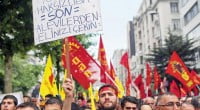The Journalists and Writers Foundation’s suggestions for a constitution

Date posted: December 21, 2011
Ihsan Yilmaz
Several civil society organizations have been presenting their suggestions for a new constitution to a parliamentary sub-committee. A few days ago, the Journalists and Writers Foundation (GYV) was received and listened to by the committee. The GYV did not present a full package but summarized its understanding on the most sensitive issues that have been hotly debated in the country.
I find this development very important for two reasons. The first one is related to the identity of the GYV. As is well known, its honorary chairman is an influential Islamic scholar, Fethullah Gülen, who is widely respected in Turkey. Gülen has inspired a worldwide faith-based movement of volunteers known as the Hizmet movement, which is very influential in the country. Thus, what the Hizmet says about the new constitution is very important.
Secondly, the content of the GYV package is crucial. I must say that I find it very courageous. The movement is known to be cautious about sensitive issues in order to not attract the wrath of oppressing forces in the country but also not to alienate its supporters. Nevertheless, with its new suggestions, the GYV under the guidance of Gülen has shown another case of leading the movement by taking some risk. Now, let me explain what I mean by “taking some risk.”
The GYV’s proposal, which is one of the most important, is centered around the description of citizenship in the Constitution; the current Constitution says, “Everyone bound to the Turkish state through the bond of citizenship is a Turk.” Instead of stressing “Turk,” the GYV suggested that the new constitution should adopt the concept of “constitutional citizenship,” not stressing identity and belonging but accepting differences as part of the country’s richness. With regards to people’s right to education in their mother tongue, the GYV stated that “in primary and middle schools, the language of education should be Turkish; however, when there are demands from parents that another language should be used as the language of education, then there should be arrangements to cater to those demands,” adding that many countries use a dual-language education system. Details like how many hours should be dedicated to another language and how many courses should be taught in that language should be determined depending on demand. Regional autonomy is another topic that is included in the GYV suggestions. The GYV underlined that “it should be clearly stressed that the state is unitary, not federal, but there should be structuring to allow local administrations without harming the state’s political unity. Local administrations’ duties and responsibilities should be developed in accordance with contemporary practices.” Another one of the GYV’s suggestions relates to the status of the Religious Affairs Directorate, which the GYV says should be autonomous and include services for people from all religions. The GYV also suggested that the decision about what religion will be taught to children in school and whether or not children will attend religion classes should be up to the parents of those children.
The Hizmet movement in Turkey is mainly composed of Sunni Turks even though it is also influential among Kurds. The movement has always been wrongly accused of Turkish nationalism. Even though this is not entirely true, sometimes some participants of the movement could be confused with regards to borders between patriotism, civic nationalism and un-Islamic ethnic nationalism. Most of these confused people would oppose education in the Kurdish language. Thus it is crucial that against such a background, and the movement makes a bold move by challenging the conventional nation-state understanding in Turkey. Similarly, many Sunnis would not be happy to change the status of the Religious Affairs Directorate or see compulsory religious education classes removed, but the movement has been courageous on these issues as well.
The movement’s bold move should also be encouraging for the Justice and Development Party (AKP) as both the movement and the AKP more or less address similar audiences. One may interpret these suggestions as quality “concessions” by a predominantly Sunni-Turkish group, and I believe if other influential sections of society can make such “concessions,” a reconciliation is possible if not hampered by the whims and desires of the politicians, such as trying to have a presidential system.
Source: Today's Zaman , 21 December 2011, Wednesday
Tags: Democracy | Journalists and Writers Foundation | New constitution in Turkey | Turkey |
























